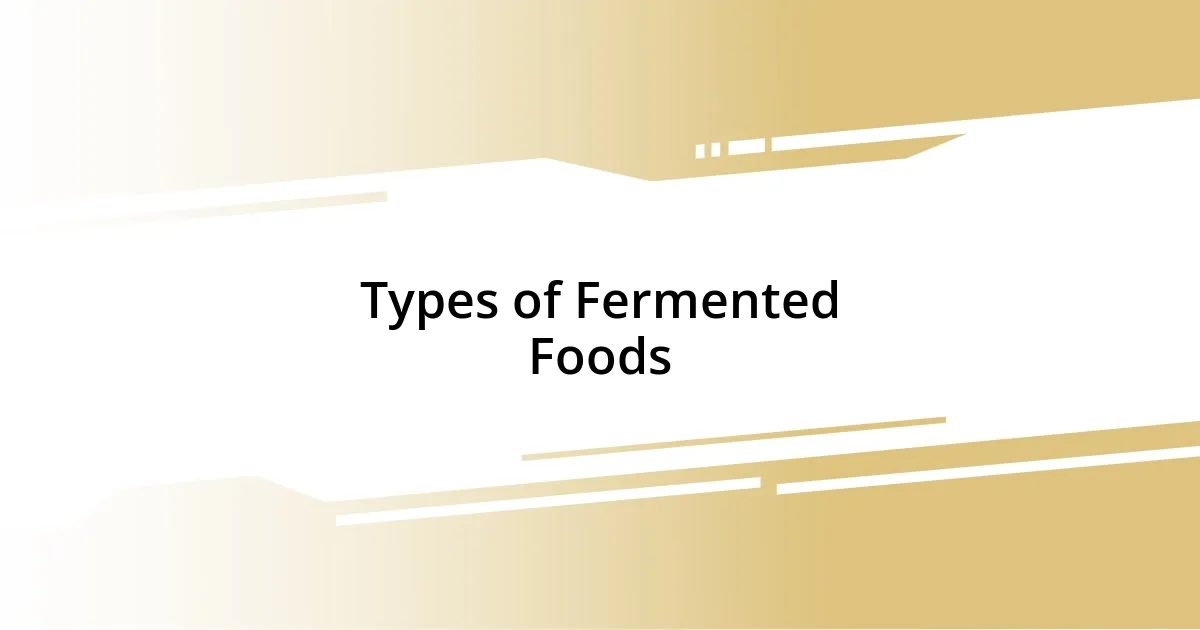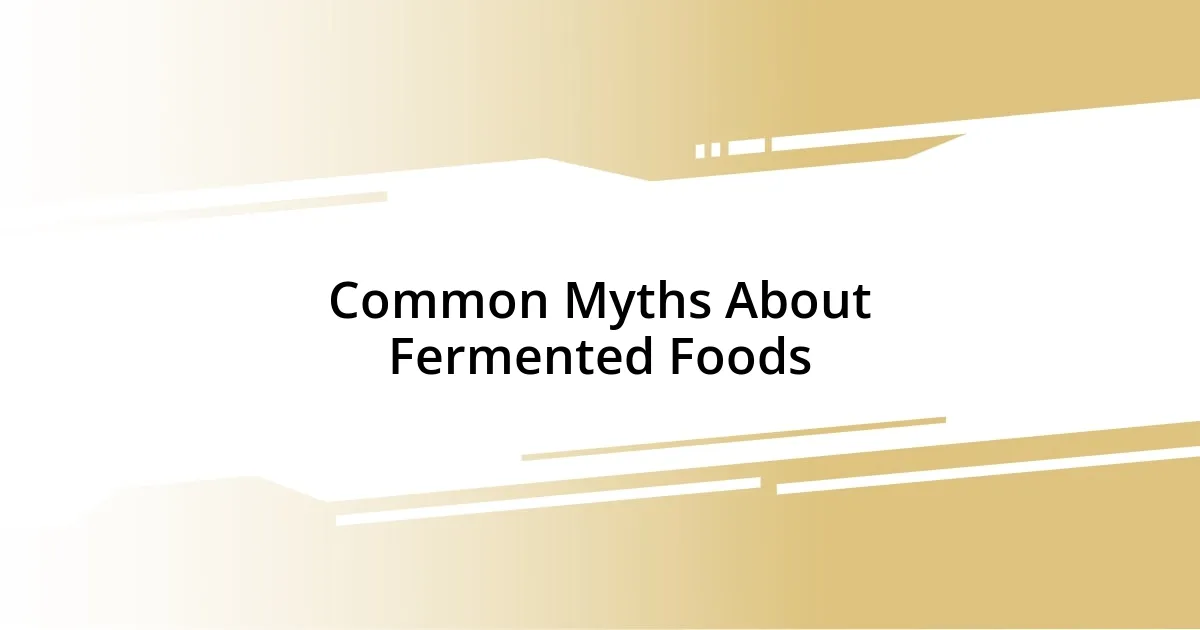Key takeaways:
- Fermented foods enhance flavor and promote gut health through beneficial microorganisms, linking diet to overall well-being.
- Common varieties include yogurt, kimchi, sauerkraut, and kombucha, each with unique flavors and cultural significance.
- Misinformed beliefs about fermented foods being unhealthy or alcoholic often deter people from trying them.
- Personal experiences with fermentation can foster a deeper appreciation for culinary traditions and encourage home food preparation.

Introduction to Fermented Foods
Fermented foods have a fascinating history, rooted in the human desire for preservation and flavor enhancement. I remember the first time I tried homemade kimchi; the tangy crunch captivated not only my taste buds but also my curiosity about the fermentation process. Have you ever wondered how something as simple as cabbage can transform into a probiotic powerhouse?
When I think of fermented foods, I picture a vibrant array of colors and textures, from tangy sauerkraut to creamy yogurt. The magic happens when microorganisms, like bacteria and yeast, break down sugars and starches. This process not only boosts flavors but also fosters a unique community of beneficial bacteria that can support gut health. It’s incredible how food can nourish us on more than just a physical level!
As I’ve delved deeper into the world of fermentation, I’ve discovered it’s not just a method of food preparation; it’s an art form that connects us to our heritage and traditions. Each bite of fermented food tells a story, bursting with culture and love that’s been passed down through generations. Have you tried making any fermented dishes at home? There’s something deeply satisfying about creating your own probiotic-rich foods!

Benefits of Fermented Foods
Fermented foods offer a plethora of health benefits that truly impressed me when I learned more about them. For instance, the probiotics in foods like kefir and kombucha can effectively aid digestion and enhance gut health. I remember feeling a noticeable difference in my bloating after I started incorporating these foods into my meals; it was as though my body finally found its natural rhythm again.
Moreover, the nutritional profile of fermented foods is quite remarkable. They not only provide essential vitamins and minerals but also improve nutrient absorption from other foods. On days when I add a side of kimchi to my lunch, I notice how energized I feel afterward. It’s amazing how these tiny microorganisms can elevate a meal’s overall nutritional value and invigorate our daily lives.
Finally, fermented foods can play a surprisingly supportive role in mental health too. Research suggests that gut health is closely linked to brain health, and since I began my journey with fermented foods, I’ve experienced a greater sense of well-being. Have you ever noticed how changes in your diet affect your mood? It’s a fascinating connection that’s encouraged me to explore more of what these foods can offer.
| Benefit | Description |
|---|---|
| Gut Health | Probiotics in fermented foods support digestion and balance gut microbiota. |
| Nutrient Absorption | Enhances the absorption of vitamins and minerals from meals. |
| Mental Wellness | Linked to improved mood and mental health due to gut-brain connection. |

Types of Fermented Foods
When I think about the variety of fermented foods, it’s like opening a colorful treasure chest of flavors and traditions. From my experiences, each type brings something unique to both palate and health. The world of fermentation is diverse and incredibly rewarding, inviting us to explore ingredients we’ve often overlooked. Here are some common types I’ve enjoyed and recommend:
- Yogurt: A creamy staple that’s not only tasty but packed with probiotics.
- Kefir: This tangy drink is a delightful blend of yogurt and a fizzy kick, perfect for a morning boost.
- Sauerkraut: Crunchy and sour, it’s a fantastic addition to sandwiches or as a side dish.
- Kimchi: My personal favorite, with its spicy, complex flavors that elevate any meal.
- Miso: A savory Japanese paste that enhances soups and marinades with its umami depth.
- Kombucha: This fizzy, fermented tea has become my go-to for a refreshing drink, especially in summer.
Each fermented food carries its own story, a reflection of the culture and history behind it. I remember trying my first bowl of miso soup at a quaint little restaurant. The depth of flavor took me by surprise, revealing layers that seemed to dance on my tongue. It sparked a curiosity in me to try making my own miso-based dishes at home, expanding my culinary skills in the process. It’s not only about tasting these foods but also about connecting with the rich heritage they embody.

How to Incorporate Fermented Foods
Incorporating fermented foods into your diet can be a delightful journey, and I’ve found that starting small makes the transition easier. For instance, I began my adventure by adding a dollop of yogurt to my morning smoothie. It not only enhanced the creaminess but also introduced a pleasant tang that I grew to love. Have you ever noticed how little changes can have a big impact?
Another way I enjoy these foods is by blending them into meals. Tossing kimchi into a stir-fry or on top of avocado toast adds a zesty kick that transforms the dish. It surprises me how something so simple can elevate my meal while providing all the gut-loving benefits. Plus, it’s a great conversation starter at dinner parties—just imagine everyone’s eyes lighting up when they discover the tasty twist!
Don’t forget about beverages; I’ve found that drinking kombucha in place of sugary soda has made a remarkable difference. The fizz feels indulgent but comes with a healthy backing of probiotics. Whenever I sip on it, I feel like I’m treating myself while doing my body a favor. Have you tried substituting your usual drinks with something more nutritious? It’s amazing how refreshing those creative swaps can be!

Common Myths About Fermented Foods
It’s surprising how many people think fermented foods are just a modern trend. In my experience, these foods have been around for centuries, often used for their preservation benefits before refrigeration existed. I remember chatting with an elder in my community who shared stories about his grandmother’s pickled vegetables, passed down through generations. It made me realize that these age-old practices aren’t just fads; they’re rooted in cultural history.
Another common myth is that fermented foods are packed with unhealthy bacteria. I used to worry about this myself until I learned that the bacteria involved in fermentation are actually beneficial for our gut health. The thought of welcoming these “good guys” into my digestive system felt empowering. Have you ever thought about how much of an impact these tiny organisms can have? It’s fascinating to know that they work hard to support immunity and overall health.
Lastly, many believe that all fermented foods contain alcohol. While some, like kombucha or kefir, may have trace amounts, most fermented foods, such as yogurt or sauerkraut, are alcohol-free. I remember trying to explain this to a friend who was hesitant to try kombucha because of the fear of intoxication. It made me laugh when I realized how misguided that was. It really shows how important it is to educate ourselves about what we eat. Understanding these myths can help open the door to a truly enriching dietary experience.

Personal Experience with Fermented Foods
When I first ventured into the world of fermented foods, I was overwhelmed by the variety available. My initial try with sauerkraut was an eye-opener—I had always thought it was just slaw! The tangy crunch surprised me, and I noticed how it made me appreciate flavors in my meals that I had overlooked before. Have you ever experienced a food that completely shifted your palate? It’s a revelation that keeps me exploring.
I distinctly remember my first experience with kimchi. One evening, a friend invited me over for dinner, and she served a homemade batch. I hesitated at first, fearing the spice, but once I took that first bite, I was hooked! The balance of heat and fermentation opened new dimensions to my taste buds. It felt like a culinary adventure, reminding me that sometimes stepping outside our comfort zones can lead to delightful surprises. Isn’t it intriguing how certain foods can create such strong memories?
Now, I can’t help but enjoy the ritual of making my own fermented foods at home. A few months ago, I decided to try my hand at homemade yogurt. The process required patience, but the moment I tasted the creamy, tangy product was indescribable. I felt a sense of accomplishment and pride, knowing I created something nourishing from scratch. Have you ever taken the plunge into DIY food preparation? It can be both rewarding and educational, offering insights into not just the foods we eat, but also our cultural practices around food.














